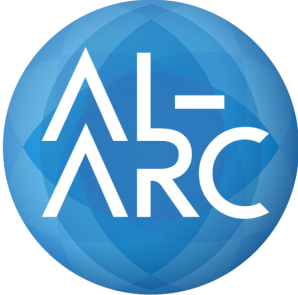All Upcoming Events
Baltic Demonstration 20-21.9.2023, Karlskrona, Sweden
The focus will be on anomaly detection such as illegal fishing, smuggling or threats to critical underwater infrastructure.
Arctic Demonstration 16-20.10.2023, Reykjavik, Iceland
In the Arctic Demonstration the focus will be on major Search and Rescue incidents as well as safe navigation including ice and weather information.
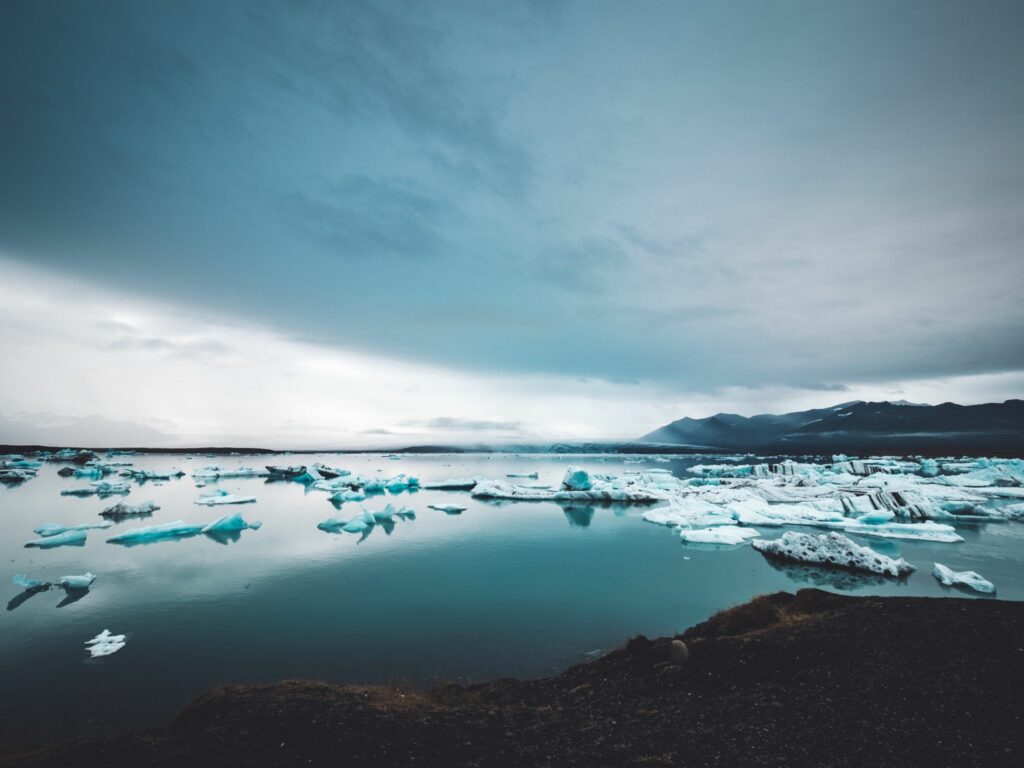
Past Events
2023
Dynamic Demo Frontend Testing at Fraunhofer IOSB, Karlsruhe, Germany 7th – 8th of March 2023
The AI-ARC Backend testing occurred on the 7th and 8th of March 2023. Tests were performed on partner services to verify they will work as planned before the upcoming Baltic and Arctic demos.

The AI-ARC front end testing got underway at FraunhoferI OSB in Karlsruhe, Germany today. Participants have heard presentations on front end testing and services for big data analytics and participated in discussions.

Boris Wagner from FraunhoferIOSB demonstrating the DigLT Map Display during the AI-ARC front end testing event in Karlsruhe, Germany today. The virtual reality map display offers a fast and natural remote collaboration with a true 3D display of geodata
2022
Lab tests and consortium meeting, Karlsruhe, Germany 13th -15th December 2022
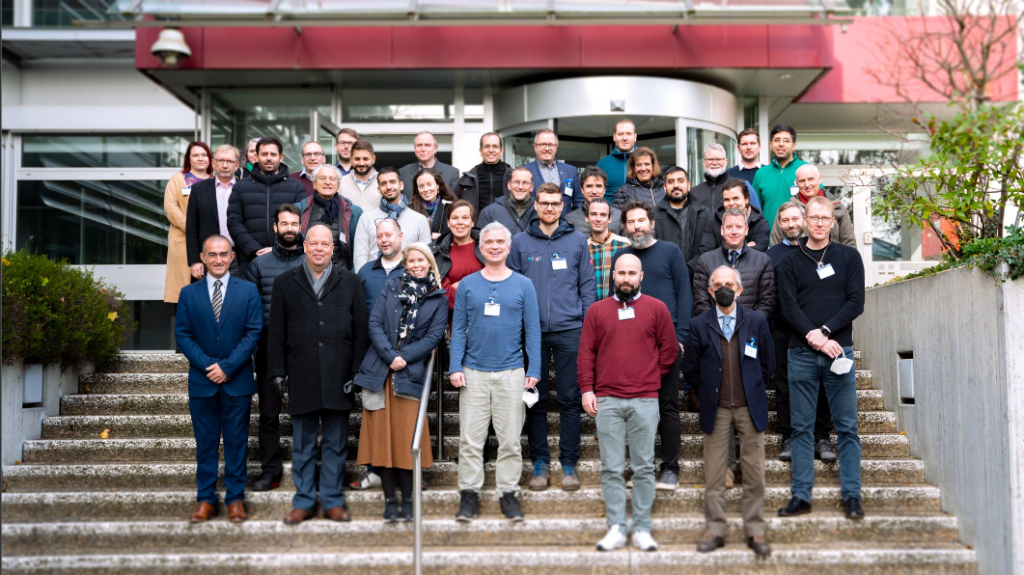
Three days of the AI-ARC consortium meetings and Lab tests took place in Karlsruhe, Germany in December.
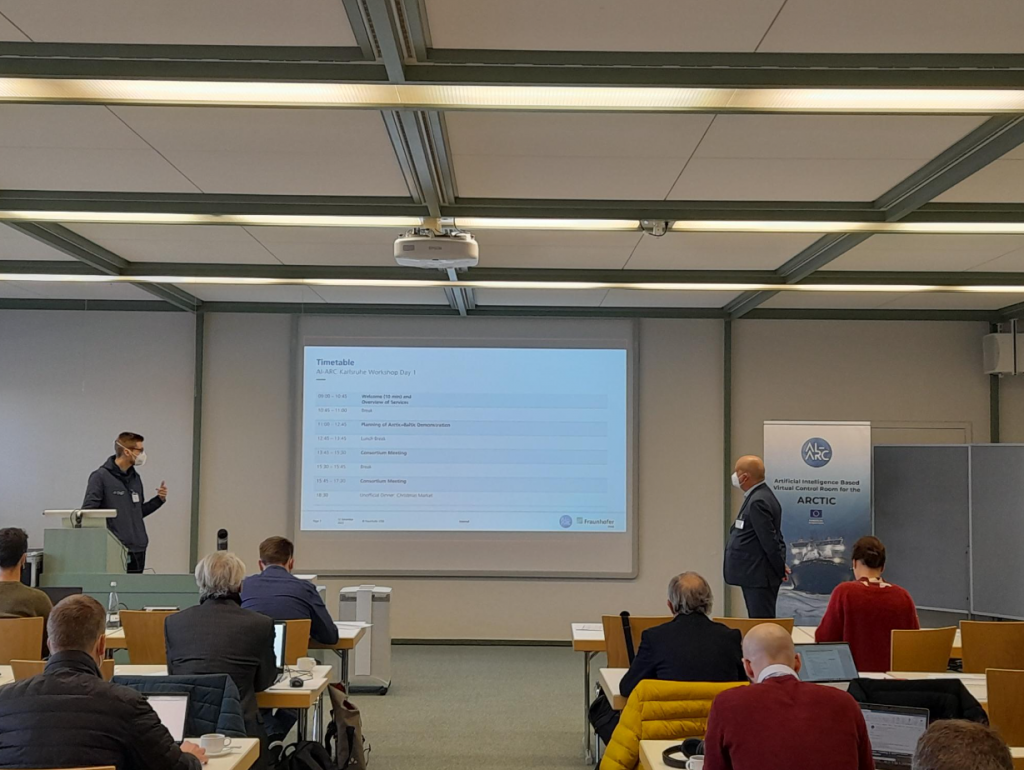
The events on Tuesday 13th began with a warm welcome from meeting hosts at Fraunhofer IOSB, Mathias Anneken, and Adrian Hoppe. AI-ARC Project Coordinator Isto Mattila and Adrian Hoppe from Fraunhofer IOSB welcomed the partners that are attending the workshop.
The program for the first day included a Consortium meeting and the planning of Arctic and Baltic Demonstrations.
Tiina Jortikka, Head of the HCS presented the following video about the 45th Antarctic Treaty Consultative Meeting taking place in 2023.
45th Antarctic Treaty Consultative Meeting in Helsinki, Finland – YouTube
← The first of three days of the AI-ARC consortium meeting and Lab tests begin in Karlsruhe, Germany today.
Mathias Anneken led a session on services overview where service providers spoke on the ‘main idea’ of each service: what they can do, and what they might rely on. Ensuring a clear understanding and refresher of AI-ARC services for everyone in attendance in order to facilitate discussions about the upcoming Arctic and Baltic demonstrations that are taking place in 2023.
Adrian Hoppe and Mathias Anneken from Fraunhofer IOSB, presenting on the VCR at the hybrid event. →


Kevin Fitzgibbon from Munster Technological University led a session about the operational requirements of the AI-ARC Project System, giving a detailed presentation of non-functional and functional requirements and highlighting the expected results the consortium will try to achieve. Current plans for the Arctic and Baltic demonstrations were presented, followed by a discussion of the demonstrations.
← Kevin Fitzgibbon from MTU leads a session on the operational requirements of the AI-ARC Project System.
A consortium meeting then took place, this was led by AI-ARC project manager, Johanna Karvonen from Laurea. The consortium meeting was a crucial discussion and reflection of the first year of AI-ARC and a fundamental moment to plan the actions for the coming months. It began with a report by the Project Manager focused on the midterm review and recommendations from the EC and reviewers and a review of the Project schedule.
The Ethics and Data Manager and work package leaders delivered short presentations on ongoing project progress and technical implementation.
After a long day of productive meetings and discussions, the AI-ARC consortium members spent the evening at the Karlsruhe Christmas Market.
AI-ARC project manager, Johanna Karvonen from LAUREA led the consortium meeting. →


Day 2
The second day of AI-ARC meetings took place at Fraunhofer IOSB on the 14th of December.
On day 2, Kevin Fitzgibbon from MTU and Pontus Svenson from Rise Sweden presented the planning of the Arctic and Baltic Demonstrations that will respectively take place in Reykjavik, Iceland, and Karlskrona, Sweden next September and October 2023.
← Pontus Svenson, Rise Sweden
Petteri Partanen from Laurea presented the results of the Civilian Mariner survey and Interview.
Petteri Partanen, Laurea →

Workshops participants were also involved in the working group session “Visualization of Data in the Virtual Control Room”, where topics such as anomaly, interaction, risk, reliability, iceblock, and in-situ observation were discussed and presented.



Bernard Garnier from Ventura associates, Kevin Willis from UOP, and Isto Mattila from Laurea presented their group’s discussion points from the working group sessions.
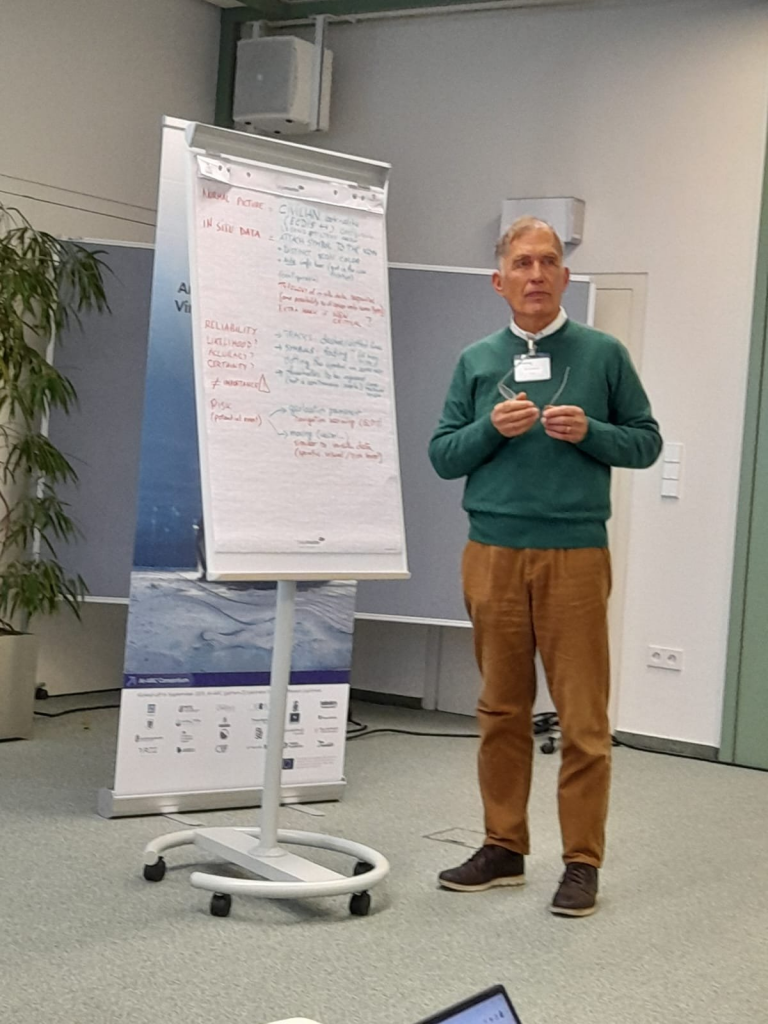
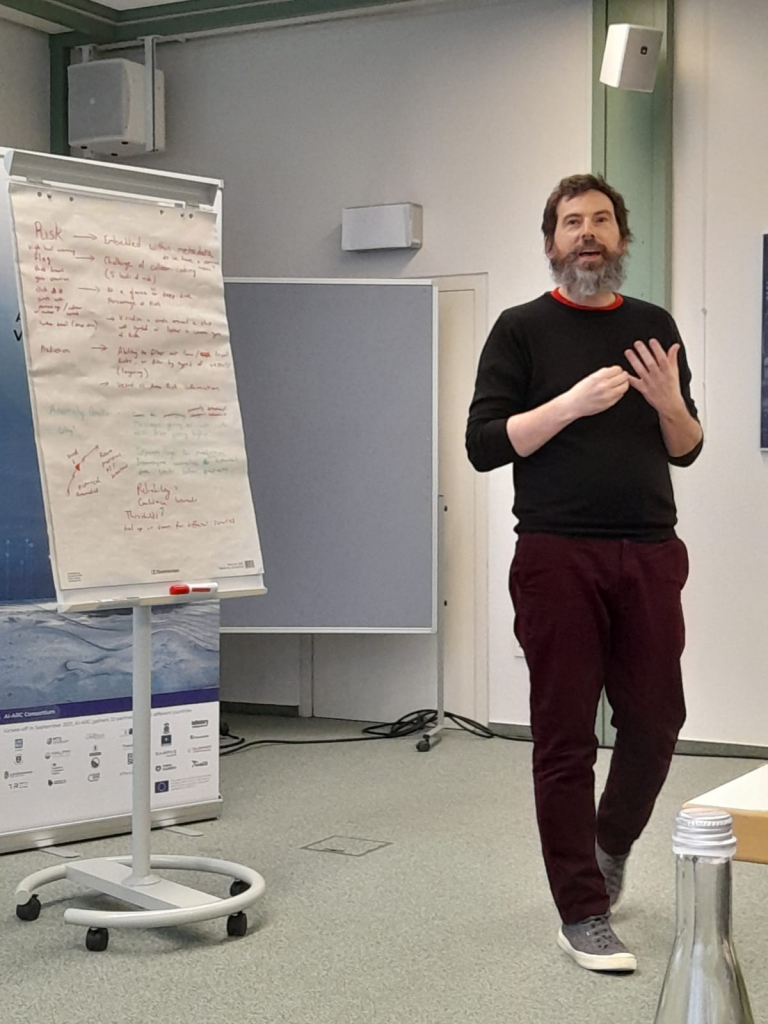
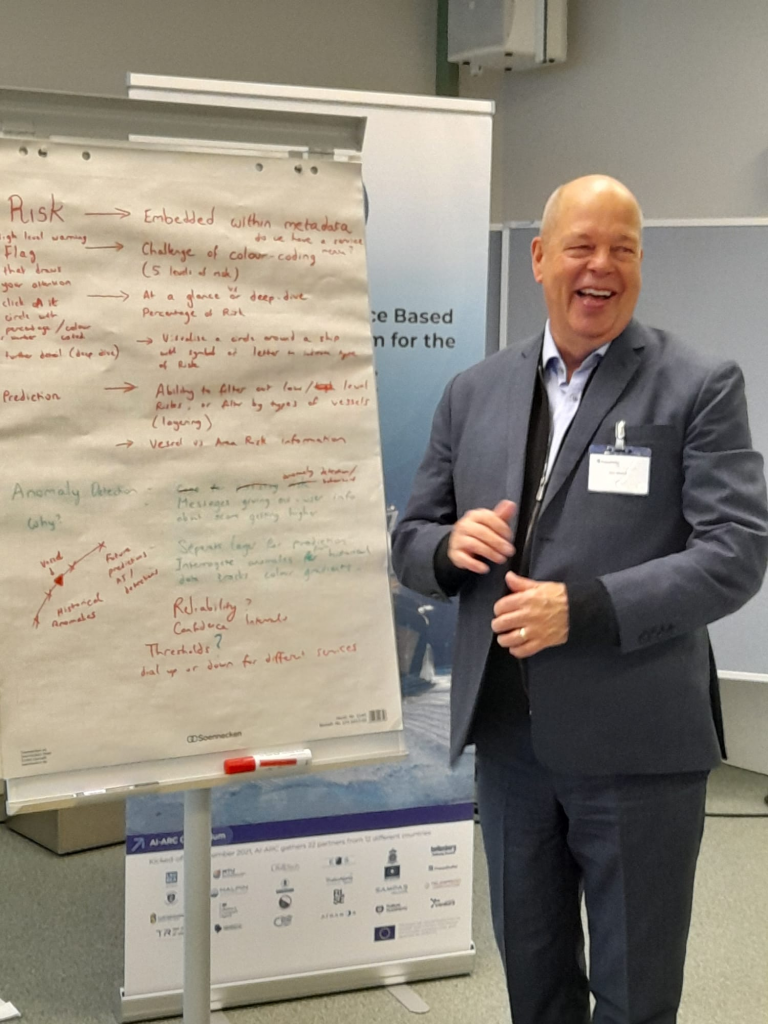
After a busy day, the consortium members networked together at the official AI-ARC Dinner at a German Brauhaus .
________________________________________________________________________________________________________________________________________________________
AI-ARC Workshop 2 – D2.2 in Karlskrona, Sweden 26th – 28th April 2022: Increasing situation awareness of Coast and Border Guards to prevent illegal activities
Deliverable 2.2 WORKSHOP 02:
Based on WORKSHOP 2 REPORT – Lead Author: Munster Technology University; Contributors: LAU

The AI-ARC “Artificial Intelligence based Virtual Control Room for the Arctic” project’s main objective is to create an innovative and user-friendly AI based platform, the Virtual Control Room (VCR), that has the power to greatly improve maritime situational awareness, decision-making, communication, available rescue resources, and thus the safety of all maritime actors, particularly in the Arctic Sea.
Workshop 02: Increasing situational awareness of Coast and Border Guards to prevent illegal activities was a two and a half-day workshop event that took place in Karlskrona, Sweden from the 26th – 28th of April 2022. It was co-organised by three AI-ARC project partners: Munster Technology University, (Ireland), Laurea University of Applied Sciences, (Finland), and the Swedish Coast Guard.
The opening session served as an introduction to the workshop and provided an overview of the project to VIP guests from the SCG and the external advisory board. Isto Mattila, Project coordinator of the AI-ARC Project and Director of R&D at Laurea University of Applied Sciences, welcomed all consortium partners and VIP guests to Workshop 2. His presentation provided an overview of the project and informed attendees that word about the AI-ARC project is growing with increasing external interest from prominent European organisations including the European Fisheries Control Agency (EFCA).
The Swedish Coast Guard is a key consortium partner in the AI-ARC project and in her presentation, Director Therese Mattsson emphasised the important role that the Swedish Coast guard (SCG) plays in providing support to maritime authorities in the Baltic Sea. She outlined the daily roles and responsibilities of the SCG in addition to their facilities, system capabilities and assets which can operate in Arctic weather. Timo Hellenberg and Professor Pekka Visuri (Hellenberg International) presented on the findings of their investigation into the Arctic Sea hijacking Incident which occurred in 2009 in the Baltic Sea. The Arctic Sea Incident served as a useful case study to demonstrate the challenges involved for Law enforcement agencies and CGs in identifying smuggling and other illegal activities. Lastly, Dr. Adrian Hoppe (Fraunhofer) presented an overview of the VCR Display and the Digital Map Table software system. This system offers the AI-ARC a 2D and 3D solution for a shared maritime situational awareness picture.
For the remainder of the workshop, participants engaged in small working groups, each consisting of Law Enforcement and Coast Guard representatives, to address key issues relating to improving situational awareness and tackling illegal maritime activities in the Baltic Sea and Arctic/High North regions. The results of the group work sessions during the Karlskrona workshop have created a number of action points for the task leaders in WP3 including the integration of workshop outputs into the ongoing technical tasks, decisions surrounding the purchasing and storage of data, and the selection of use cases for the live demonstrations that are all due to take place in 2023.The latter task will involve detailed planning and coordination between WP2 and WP3 leaders in addition to the CG partners who will host the demos.
The successful completion of the AI-ARC Workshop 2 in Karlskrona served as a key project milestone (MS7). The workshop was an ideal opportunity for project partners to refine and clarify information surrounding the technical development of the project. The Karlskrona workshop enabled face-to-face discussions on a number of key issues relating to the project’s progression. As a result of these productive interactions, partner engagement has stepped up in intensity and will continue online.
Finally, it is worthy highlighting that for many of the project partners, Workshop 2 in Karlskrona, Sweden was the first opportunity that consortium members had for a face-to-face meeting owing to previous travel restrictions because of the Covid-19 global pandemic. Therefore, it can be concluded that the workshop was a valuable opportunity for participants to make important networking connections with other project partners in addition to providing fruitful information outputs for task leaders and contributing to the ongoing progression of the AI-ARC project.
The next face-to-face consortium meeting is in the early stages of being planned for later this year (November 2022) in Germany. Regular consortium meetings in person will assist with ensuring that the project’s momentum continues on track and consortium partners keep moving forward with the work.
________________________________________________________________________________________________________________________________________________________
AI-ARC Workshop 1 – D2.1 17th of February 2022
Text is based on WORKSHOP 1 REPORT – Lead Author: Hellenberg International (HI); Contributors: LAU, MTU
The launch of AI-ARC Workshop 1 – ‘Arctic SAR Operations’ on the 17th of February 2022, officially commenced project activities for Task 2.1 – ‘Review of Crisis Coordination and Response Arrangements in the European Arctic and High North’.
The AI-ARC (Artificial Intelligence based Virtual Control Room for the Arctic) project Workshop (1) was organised as a one-day webinar on MS Teams on the 17th of February 2022. The aim of the Workshop was to assess and compare Arctic and High North crisis management and co-operation arrangements in the context of intergovernmental relations. It aimed to identify the areas of cross-border risks and needs to improve the cross-border, cross-sectoral and multi-level cooperation.
The Workshop was arranged by Hellenberg International (task leader on T2.1) together with the Laurea University of Applied Sciences (LAU), Finland and the National Defence Foundation of Lithuania. As Work Package (WP2) leader, Munster Technological University (MTU), Ireland, also contributed to this workshop by moderating the panel sessions, with the European Organisation for Security (EOS), Belgium, overseeing the dissemination and communication activities.
Originally, the workshop was intended to be held in Rovaniemi Finland, as an in-person three-day event. However, due to the global pandemic and the uncertainty surrounding travel restrictions, the decision was taken to host the workshop online instead.
The workshop consisted of three panel sessions with presentations from project partners, coast guard end users, diplomats, policy officers and stakeholders.
Session 1 “Arctic challenges in the Intergovernmental Context” examined the latest developments of Arctic crisis coordination and other intergovernmental decision-making arrangements. It reviewed the EU´s Arctic crisis management policy and derived lessons for the international civil security cooperation in the Arctic and the High North.
Session 2: “Operational challenges in the Arctic Search and Rescue” looked at the tactical-operational challenges related to search and rescue missions in the Arctic and High North. This included the identification of areas for cross-border risks and the needs for cross-border, cross-sectoral and multilevel cooperation in the Arctic and High North region.
Session 3: “The Concluding session” covered issues of “Cooperation between industry and science” and “Crisis Coordination and Response Arrangements, before wrapping up with a final Q&A session and concluding remarks from the organisers”.
To summarise, Workshop 1 was an official start to the AI-ARC WP2 Task 2.1 project activities, including planning and implementation. Many of the workshop presentations highlighted key challenges and actions that the AI-ARC project should seek to address in order to fulfil the project Objectives and KPIs.
Workshop 1 was also an important AI-ARC event for project dissemination. During the workshop, EOS (Belgium) posted live updates on AI-ARC’s social media accounts including LinkedIn and Twitter. The high level of dissemination activities served as a watershed for the project, prior to Workshop 2 in Karlskrona held in April 2022.
________________________________________________________________________________________________________________________________________________________
